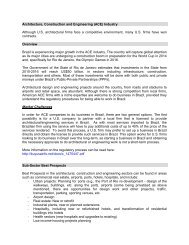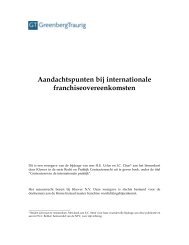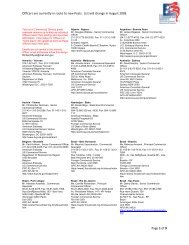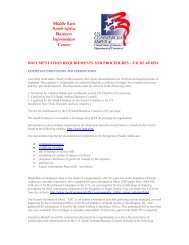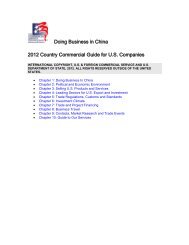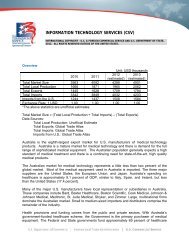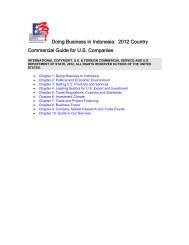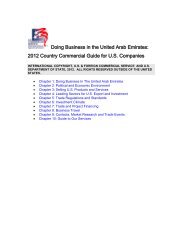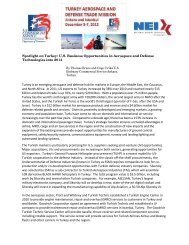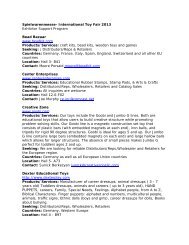2011 Bahrain Country Commercial Guide - US - Export.gov
2011 Bahrain Country Commercial Guide - US - Export.gov
2011 Bahrain Country Commercial Guide - US - Export.gov
You also want an ePaper? Increase the reach of your titles
YUMPU automatically turns print PDFs into web optimized ePapers that Google loves.
double oil production by 2013. In <strong>2011</strong>, the Government increased fiscal expenditure and<br />
announced new projects in the oil & gas sector. <strong>Bahrain</strong> is not a member of Organization of the<br />
Petroleum <strong>Export</strong>ing Countries (OPEC).<br />
Due to its relatively limited energy reserves, <strong>Bahrain</strong> is diversifying its economy away from oil<br />
and gas production. The kingdom‘s long-term ―Economic Vision 2030‖ development plan<br />
highlights the need for diversification by increasing the number of <strong>Bahrain</strong>is in the workforce<br />
(―<strong>Bahrain</strong>ization‖). The plan also seeks to raise the standards of industrialization, privatization,<br />
training and education of the <strong>Bahrain</strong>i work force, establishing <strong>Bahrain</strong> as a regional center for<br />
human capital.<br />
The Government of <strong>Bahrain</strong> has actively sought to develop the transportation and<br />
communication infrastructure necessary to attract and foster international business. With the<br />
Government seeking to reduce <strong>Bahrain</strong>‘s reliance on oil, <strong>Bahrain</strong> has become a regional<br />
financial center with a regulatory infrastructure of high international standards. To overcome its<br />
small size, <strong>Bahrain</strong> has further sought to position itself as a regional services hub. After early<br />
success, the financial, telecommunications, and transportation sectors have faced stiff<br />
competition from Dubai and elsewhere. In its quest to increase foreign investment, the<br />
Government of <strong>Bahrain</strong> has targeted six "economic clusters" for further expansion: tourism,<br />
information and communication technology, health care, education and training, business<br />
services, and financial services. Downstream aluminum and petrochemicals industries also<br />
remain priorities.<br />
Based on the <strong>2011</strong>-2012 budget, <strong>gov</strong>ernment expenditures accounted for approximately 26<br />
percent of <strong>Bahrain</strong>'s GDP. The Government is heavily involved in industry, with wholly or<br />
partially <strong>gov</strong>ernment-owned parastatals dominating certain sectors of the economy. In 2006,<br />
the Government transferred control of all parastatal companies to a quasi-independent holding<br />
company – <strong>Bahrain</strong> Mumtalakat Holding Company – to increase the productivity and the<br />
profitability of the Government's investments. Mumtalakat was also established to serve as a<br />
quasi-sovereign wealth fund to invest in international financial markets and international<br />
projects.<br />
Market Challenges Return to top<br />
The divide between the <strong>gov</strong>ernment and the private sector is not well defined in <strong>Bahrain</strong>,<br />
leading to potential conflicts of interest. U.S. companies have noted a lack of transparency in<br />
<strong>gov</strong>ernment project tendering at times (see Chapter 6, Investment Climate). The GOB<br />
implemented a new tender law in January 2003 to promote a more transparent tendering<br />
process. The Tenders Board regulates and oversees most of the Government‗s tenders and<br />
purchases.<br />
Entrenched local business interests with <strong>gov</strong>ernment influence can cause problems for<br />
potential competitors. Interpretation and application of the law sometimes varies by ministry,<br />
and may be dependent on the stature and connections of an investor's local partner.<br />
Departures such as these from the consistent, transparent application of regulations and the<br />
law remain rare, and investors are usually pleased with <strong>gov</strong>ernment cooperation and support.<br />
Bureaucracy and poor coordination between ministries on occasion impedes new industrial<br />
ventures. The Government's priority of "<strong>Bahrain</strong>ization" of the labor force – a quota system<br />
3





